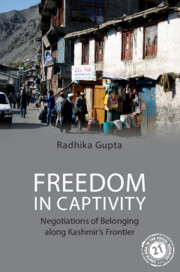Book contents
- Frontmatter
- Contents
- List of Figures
- Acknowledgements
- List of Abbreviations
- Notes on Transliteration
- Introduction: Freedom in Captivity
- 1 Genealogies of Political Consciousness
- 2 Reforming Self and Society
- 3 Fighting for Justice
- 4 Talking about Culture
- 5 Living on the Edge
- Epilogue
- Glossary
- Bibliography
- Index
1 - Genealogies of Political Consciousness
Published online by Cambridge University Press: 10 January 2023
- Frontmatter
- Contents
- List of Figures
- Acknowledgements
- List of Abbreviations
- Notes on Transliteration
- Introduction: Freedom in Captivity
- 1 Genealogies of Political Consciousness
- 2 Reforming Self and Society
- 3 Fighting for Justice
- 4 Talking about Culture
- 5 Living on the Edge
- Epilogue
- Glossary
- Bibliography
- Index
Summary
Rescuing Place from Territory
When rendering their history, people in Kargil usually divided their past into ancient (qadim) and modern (jadid) eras (zamana) in Urdu. The ancient period referred to a longue durée stretching from the time of the early settlement of the region during the ninth and tenth centuries CE to the period of princely Dogra rule, beginning in the mid-nineteenth century. The modern period corresponds to Kargil’s incorporation as part of the erstwhile state of J&K into post-colonial India when Hari Singh signed the instrument of accession to India in October 1947. In my first conversations with many people, some of whom later became my friends and steady interlocutors, I noticed an eagerness to relate fragments of Ladakh’s ancient history. They urged me to read historian Kacho Sikandar Khan Sikandar’s book, Qadim Ladakh (1987), praising it for being a definitive account of the region’s history. Although only some Kargili intellectuals had read parts of this book, it was widely known. Even people who had not read it first-hand invariably directed me to Qadim Ladakh. Sikandar Khan’s book in turn draws upon the Dogra administrator Hashmatullah Khan’s Tarikh Jammun, Kashmir, Ladakh aur Baltistan (History of Jammu, Kashmir, Ladakh and Baltistan) (1939). Both these books serve as significant historical sources on Kargil and Baltistan. Written by administrator-turned-local-historians at very different points in time, both these sources are in Urdu. As Daniela Bredi has pointed out, both works are quite different from the ‘usual Indo-Muslim’ historical accounts for they hardly rely on previously written histories. Rather, information was collected from official papers, observations of the landscape and oral accounts. These renditions of history have been readily reproduced in contemporary constructions of a collective regional memory.
Copies of Qadim Ladakh were no longer easily available in Ladakh by the time I started fieldwork. My access to this book was mediated by a much-respected local historian and poet, Abdul Hamid Tanvir, a Sunni Muslim of Kashmiri origin whose ancestors had settled in Kargil during the Dogra period. Even though he was in his seventies and struggling with poor eyesight, Tanvir sahib insisted on giving me ‘classes’ in the history of Kargil.
- Type
- Chapter
- Information
- Freedom in CaptivityNegotiations of Belonging along Kashmir's Frontier, pp. 32 - 56Publisher: Cambridge University PressPrint publication year: 2023



